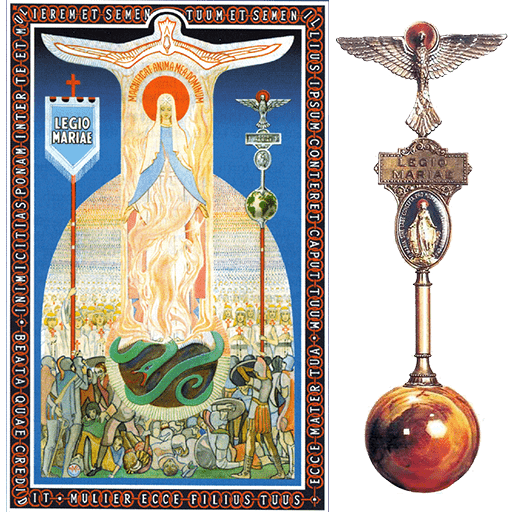Concilium Bulletin September 2023 - Notices
As the booklet ‘Some Handbook Reflections’ is very helpful to all legionaries we plan over the coming year to include some extracts from it. Given the focus on correspondence in the Bulletin this month, we are beginning with the following extract:
Council Reports (page 43,44).
‘’… it would be permissible to deal with the business of that Curia only at every second or third meeting of the Comitium’’. (Handbook: The Curia and the Comitium)
It is evident from the above that a Comitium, which has a responsibility for one or more Curiae, is expected to deal with the business of that Curia (or Curiae) regularly and frequently and that an annual report by the Curia to the Comitium would be completely inadequate. It is important for both the Comitium and the Curia that reports should be frequent so that the Comitium may carry out its functions of superintendence of the Curia.
If this is the situation in the case of a Comitium and its Curiae, then it seems appropriate that the same should apply in the case of all higher councils and their affiliated councils. If they are to carry out their functions of government of the Legion over a large area, then it is desirable that they should be well-informed of what is happening in their area. As they have overall responsibility for the Legion in the area assigned to them then they will need frequent reports from their affiliated councils on how those councils are governing the areas allotted to them. A report only once a year or even twice a year would hardly be adequate in keeping the higher council informed of what is happening in their area. It is very desirable that reports should be taken from affiliated councils at least every three months, if possible.
Frequent reports to higher councils will enable them not just to know what is happening but, also, to assist their affiliated councils with advice and suggestions, to stimulate extension in each council area, to deal with problems at an early stage and to encourage the officers and members of these councils. Frequent reports will also help the other affiliated councils by way of examples, which they might follow, and will also help them to know how the Legion is progressing throughout the whole area of the higher council.
Many higher councils are taking frequent reports from their affiliated councils, but some are not doing so. It is hoped that all higher councils will see their way to taking reports every three months, if possible.
It should be mentioned that when reports are presented frequently, it is not necessary that they be so detailed that their preparation represents an undue burden on the officers of the councils presenting them. The reports should show how the council is carrying out its functions of government, for example, in regard to extension, visitation of attached praesidia or councils, vacant officerships, functions such as the Acies etc., consideration of new works, some details of reports presented and attendance at the council meetings.
These reports may be presented, of course, by officers of affiliated councils present at the higher council meetings. However, in the case of distant councils, the correspondents appointed by the higher council for those councils, may present the reports compiled from the minutes received monthly.
To ensure that reports are presented regularly and frequently it will be necessary for the higher council to draw up a programme with a quota of reports for each month with councils reporting on a rota basis. Obviously, in the case of a higher council with many affiliated councils, it is important that reports be concise so that the required number of reports may be presented and dealt with in the time available.
We are delighted to announce the imminent launch of our new website containing all the essays written by Frank Duff. We look forward to updating you next month about this.
In the meantime, you can find over forty essays written by Frank Duff on the Deus et Patria website:
We are all aware that the world is looking for fellowship and fraternity. In the same vein the Handbook says of the Legion of Mary ‘When it has brought together, as fellow members of the one praesidium, persons whom the world was keeping apart, it has accomplished something really great.’
Legion of Mary meetings consistently held in-person facilitate fraternity, presence to the other and imbuement of the spirit of the Legion of Mary in a powerful way. The Handbook states ‘As the burning lens is to the rays of the sun, so is the meeting to the members. The focus collects them, begets the fire, and kindles everything that comes near it. It is the meeting which makes the Legion. This bond sundered or disesteemed, the members drop away and the work falls to the ground. Conversely, in measure as the meeting is respected, so is the power of the organisation intensified.’
Now that throughout the world Covid has dissipated in the majority of areas and thankfully the global pandemic is coming to an end, active legionaries are expected to get back to ‘praesidia meetings, council meetings and officers meetings being held in- person’ as was our system pre-Covid. It is really important that we adhere to the system set out by Frank Duff in the Handbook. Frank Duff impressed upon us that ‘Those serve the Legion best, who moderate their own individuality and adapt themselves most completely and most harmoniously to the system.’

